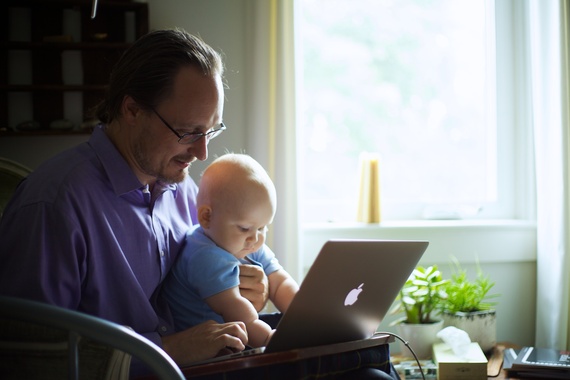For new fathers, mindfulness really boils down to paying close attention to the subtlest shifts in your partner and baby, maintaining a feeling of connection to both of them, and being able to observe your own feelings rise and fall without becoming reactive. This feeling of connection can stabilize and relax your entire home in small but significant ways that can allow you to discover a more stable and relaxed part of yourself.
Mindfulness for new fathers can be supported by considering the following facts:
1. Nothing will ever be about just you anymore. This is a good thing.
Before your partner was pregnant, you could disappear at will into your bubble of self-interest, making plans, working, hanging out. Now you have helped create life, and the part of you in that baby -- so fragile, so new -- means that there is no singular anymore. Life has moved you from the "I" to the "we," and there's no turning back. It's a relief, actually: you do not have to waste energy obsessing over your own concerns. Honestly -- self-concern was probably tiring you out.
2. Your partner is doing something you'll never understand.
She will swell and stretch and her organs will get shoved and kicked around and her joints ache for months when she can't find a comfortable position to sleep. When the contractions come, she will pulse and vibrate and moan and howl. She will vanish into a primal trance, feeling things you will never feel. The labour might be dangerous. There might be complications. It is likely that she will believe at some point she is dying. But most importantly, she is becoming two. That's worth repeating. She. Is. Becoming. Two. Her body is becoming two in a muscular, visceral way that you cannot imagine. And after the birth, she'll never quite feel like herself in the same way. She have this strange and wonderful and painful feeling of being in two places at once.
Somehow you will have to split yourself as well, becoming at least three: the person who can empathize and love and make her feel safe when needed, the person who can stand back and watch when watching is needed, and the person who can get jump right in and get their hands dirty, without saying a word.
3. You're playing a supporting role, but you need support as well.
You will feel on the periphery of the action, and a sometimes even invisible. When she was pregnant, everybody adored your partner. Now they will adore your partner and the baby together. This is as it should be: for a few brief years, they are at the center of everyone's circle. Don't let your supporting role feel so invisible that you don't reach out for help. Before the baby comes, take every father you know out to lunch and ask them what they know. Later, when you see it happening to someone else, get that guy to buy you lunch one day, and offer what you know.
4. Attentiveness is your brand of breast milk.
You did not grow the baby, and you did not give birth, and you do not feed the baby from your body. But you can feed your family with attentiveness. Attentiveness isn't just waiting around for something to happen. It is like breast milk itself. You will make it within you slowly, extracting it from the food of your daily interactions. It should feel warm, right there beside your heart. You make it with open body language. You make it by listening. You make it especially sweet by sharing your wonder and concern with your partner, late at night, when you probably should be sleeping.
5. Have this first child as though it were your second.
It's not literally your second, but it is also not the first baby -- in the world. This means you can be open and trustful, because these things have been flowing for a long time. You are standing on the shoulders of an endless line of parents who are holding down a lot of wisdom capital. They may not sharing it well enough, but we can change this.
6. Take a sober inventory of everything you are not going to lay on your child.
It's easy to look at that baby and feel a surge of hope within you that's more about what you want than about what they might become. You don't know who that baby is. They carry your genes and they'll pick up your manners and tensions. Don't try to hide your wounds, because you can't. But do make a commitment that the scars stop with you. Being forever curious about their story will make you curious about your story all over again.
7. Both you and your partner will change through this process. Don't get in the way of this with your old ideas about how things should go.
You don't know the baby. But you also don't know who your partner is becoming, any more than you know your own future. This needn't scare you. It might even make you fall more deeply in love. Imagine: the thing you are drawn to most, that makes your heart race with baffled passion, is not what you know about her, but the mystery of how she's changing before your eyes. Imagine this as the main reason for waking up tomorrow: to see what new people you are becoming to each other.
8. Give up on ever sleeping the same again.
If you are smart you can peer through the fog of your absolute fatigue to see how your baby is breaking you down and making you into a baby yourself. And you'll know that the sleeplessness is not just for the first few years. It's forever. Because in some forever way, you've woken up.
9. Learn how to use a slow cooker.
Because almost everything goes better with soup. Period.
